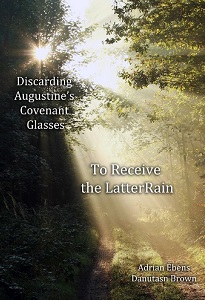Not to Destroy
The Lord’s Work
Redemption is part of the divine nature. It is the prerogative of God to have to reconstruct, not to destroy. The Son of God was given to die before the foundation of the world. The existence of sin is unexplainable; therefore not a soul knows what God is until he sees himself in the light reflected from the cross of [265] Calvary, and detests himself as a sinner in the bitterness of his soul. TM 264, 265
At the time of the feast at Bethel the hearts of the Israelites were not fully hardened. Many were susceptible to the influence of the Holy Spirit. The Lord designed that those [105] who were taking rapid steps in apostasy should be checked in their course before it should be too late. He sent His messenger to interrupt the idolatrous proceedings and to reveal to king and people what the outworking of this apostasy would be. The rending of the altar was a sign of God's displeasure at the abomination that was being wrought in Israel. The Lord seeks to save, not to destroy. He delights in the rescue of sinners. "As I live, saith the Lord God, I have no pleasure in the death of the wicked." Ezekiel 33:11. By warnings and entreaties He calls the wayward to cease from their evil-doing and to turn to Him and live. He gives His chosen messengers a holy boldness, that those who hear may fear and be brought to repentance. PK 104,105
The Lord looks upon our afflictions. He graciously and discriminately metes them out and apportions them. As a refiner of silver He watches us every moment until the purification is complete. The furnace is to purify and refine, not to destroy and consume. He will cause those who put their trust in Him to sing of mercies in the midst of judgments. He is ever watching to impart, when most needed, new and fresh blessings, strength in the hour of weakness, succor in the hour of danger, friends in the hour of loneliness, sympathy, human and divine, in the hour of sorrow. DG 224
The Lord sends warnings to His people, not to destroy them, but to correct their errors....2SM 71
The Angels Work
Angels are sent from the heavenly courts, not to destroy, but to watch over and guard imperiled souls, to save the lost, to bring the straying ones back to the fold. “I came not to condemn, but to save,” Christ declared. Have you, then, no pitying words to speak to the straying? Will you let them perish, or will you reach out to them a helping hand? —RH May 10, 1906.
"Fear not," was the answer of the prophet; "for they that be with us are more than they that be with them." And then, that the servant might know this for himself, "Elisha prayed, and said, Lord, I pray Thee, open his eyes, that he may see." "The Lord opened the eyes of the young [257] man; and he saw: and, behold, the mountain was full of horses and chariots of fire round about Elisha." Between the servant of God and the hosts of armed foemen was an encircling band of heavenly angels. They had come down in mighty power, not to destroy, not to exact homage, but to encamp round about and minister to the Lord's weak and helpless ones. {PK 256.4}
Christ’s Work to this World
Christ revealed to the world the character of God as full of mercy, compassion and inexpressible love. He came to lift up man. It was provided that whosoever should believe in Christ as his personal Saviour should be saved. In all his works he taught men that it was his mission not to destroy men's lives, but to save them. {ST, July 2, 1896 par. 3}
During His ministry, Jesus devoted more time to healing the sick than to preaching. His miracles testified to the truth of His words, that He came not to destroy, but to save. Wherever He went, the tidings of His mercy preceded Him. Where He had passed, the objects of His compassion were rejoicing in health and making trial of their new-found powers. Crowds were collecting around them to hear from their lips the works that the Lord had wrought. His voice was the first sound that many had ever heard, His name the first word they had ever spoken, His face the first they had ever looked upon. Why should they not love Jesus and sound His praise? DA 350
The Saviour would have us encourage the sick, the hopeless, the afflicted, to take hold upon His strength. Through faith and prayer the sickroom may be transformed into a Bethel. In word and deed, physicians and nurses may say, so plainly that it cannot be misunderstood, "God is in this place" to save, and not to destroy. Christ desires to manifest His presence in the sickroom, filling the hearts of physicians and nurses with the sweetness of His love. If the life of the attendants upon the sick is such that Christ can go with them to the bedside of the patient, there will come to him the conviction that the compassionate Saviour is present, and this conviction will itself do much for the healing of both the soul and the body. {MH 226.2}
Christ came to the world to seek and save the lost. When accused by the Pharisees of eating with publicans and sinners, He replied, "I am not come to call the [professedly] righteous, but sinners to repentance." He came to save, not to destroy. Souls are very precious in His sight; for by creation and by redemption they are His. Do not you realize that He holds you responsible for the salvation of those with whom you are dealing? MM 183
God might have sent His Son into the world to condemn the world. But amazing grace! Christ came to save, not to destroy. The apostles never touched this theme without their hearts glowing with the inspiration of the matchless love of the Saviour. The apostle John cannot find words to express his feelings. He exclaims, "Behold, what manner of love the Father hath bestowed [250] upon us, that we should be called the sons of God: therefore the world knoweth us not, because it knew Him not" (1 John 3:1). How much the Father loved us we can never compute. There is no standard with which to compare it.--Lt 27, 1901. {1MCP 249.5}
The power of this influence accompanied the labours of Christ and His apostles. They united prayer and the healing of the sick with the work of teaching soul-saving truths; and their labours were confirmed by the marked evidences of inspiration in their words and deeds. By teaching and by practice the message spoke with convincing power to the world. We need to come into close connection with Him who walked the earth as the divine Healer. He came not to destroy men's lives, but to save them; and He calls upon all ministers of the gospel to walk in His footsteps. The healing of the sick is to accompany our evangelical work. {AUCR, February 20, 1911 par. 2}
You need not be surprised if with hammer and chisel God cuts away the sharp corners of your character until you are prepared to fill the place He has for you. No human being can accomplish this work. Only by God can it be done. And be assured that He will not strike one useless blow. His every blow is struck in love, for your eternal happiness. He knows your infirmities and works to restore, not to destroy. 7T 264
Our Work
A few words, hastily spoken under provocation, may seem but a little thing,--just what the wrong-doer deserves,--but such words may cut the cords of influence that bind soul to soul. Our work is to restore, not to destroy; to lift up, not to cast down; "to heal the broken-hearted." We are to remember those that are bound as bound with them. There is a sustaining power in the deed done to benefit and bless humanity. {RH, January 26, 1911 par. 9}
Our work is clearly aggressive. Our warfare is to be directed against error and sin, not against one another. God requires us to be a strength to one another, to heal, not to destroy. We are to be constantly receiving light; and we are not to spurn the message nor the messengers by whom God shall send light to His people. {15MR 297.3}
My brethren, prevail by love rather than by severity. When one at fault becomes conscious of his error, be careful not to destroy his self-respect. Do not seek to bruise and wound, but rather to bind up and heal. 7T 265
When one at fault becomes conscious of his error, be careful not to destroy his self-respect. Do not discourage him by indifference or distrust. Do not say, "Before giving him my confidence, I will wait to see whether he will hold out." Often this very distrust causes the tempted one to stumble.-- MH 167, 168.





